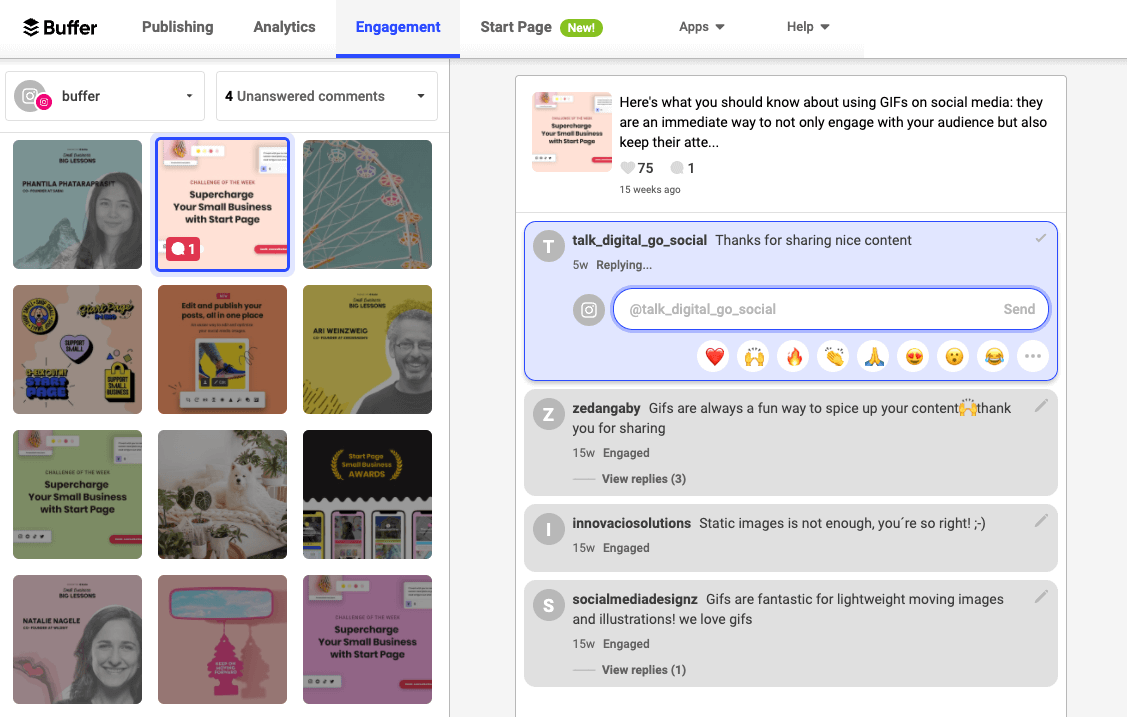
Ask Buffer: Should I Reply to Every Social Media Comment?
Expert tips for how small businesses can handle replying to social media comments. Should you reply to every comment? How quickly should you reply? What about the negative comments?

Senior Growth Marketing Manager @ Buffer
Question: I’ve been spending a lot of time growing my audience on Instagram and Twitter—which is great. But I’m starting to get a lot of comments and customer questions, and I’m finding it hard to reply to every single one. Do I need to? How quickly? And what should I do about the negative ones?
How you handle comments is incredibly important because they are a direct way to communicate with your customers, receive feedback, and build trust and loyalty—all the reasons you’re spending time on social media in the first place!
That said, you don’t have to reinvent the wheel with every comment. For starters, I recommend developing community guidelines that can guide your overall response strategy. Create a document that includes things like:
- The voice, tone, and personality you’d like to use online
- Examples of responses to anticipated questions in your defined tone and style
- Guidelines specifically for crisis communications, like major shipping delays or staff shortages
- Guidelines for when to block users from your social media profiles (many brands, for example, have policies in place making it clear that they’ll block anyone who uses discriminatory, derogatory, or harassing language.)
These guidelines will push you to think through how you’ll handle certain situations before they arise and help if other team members are managing social media on your behalf.
Now, to answer your specific questions:
Do I Have to Respond to Every Comment?
The short answer is: Yes, because it can do wonders for building community on social media, and your followers expect it. In fact, one study showed that social media is the second most popular channel for customers to communicate with a brand (and the first for Millennial customers).
Knowing that, it’s crucial to provide a positive, helpful experience to your followers by replying to their comments, even if it’s a simple emoji or “Thank you!” Those small interactions can go a long way.
Also, by replying to comments, you’re showing your followers (and customers) that you care, that you’re responsive, and that their feedback matters. All of this helps you build connections and can help you stand apart from other businesses who aren’t as responsive.
And finally, when followers know they can expect a reply from you, they’re more likely to comment on other posts, tag you in Stories, and share your brand with non-followers. All of this increases overall social media engagement and serves as word-of-mouth marketing.
How Timely Do I Have to Be?
If you don’t have a dedicated social media manager or team, replying to every comment, DM, and message can be tough. But, responding in a timely manner is important, especially on platforms like Instagram where Stories expire in 24 hours.
Set aside a chunk of time a few times a day to check in on your social media platforms. Depending on the volume of comments and messages you receive, this could be 15 minutes every couple of hours or 15 minutes every day. Schedule it into your calendar so it’s part of your routine.
You can also engage with comments before or after scheduling your posts in Buffer to get inspiration for new content. You can use Buffer’s engagement features, we have a simple dashboard that makes it easy to see and respond to all of your comments quickly, without jumping from platform to platform.
Here's a look at what it looks like when we engage with folks via comments in Buffer:

If replying to comments every day seems too daunting, you could prioritize your most engaged platform first. For example, if Twitter is the platform you receive most questions on, focus there.
No matter what your schedule, you can always set expectations with your followers a few ways, some folks include their typical response time in their bio while others pin a Tweet to their profile with more information. If you’d like to set aside certain hours every day when you’ll answer customer service questions, that's great information to share if you can.
What Should I Do About Negative Comments?
Negative comments and customer feedback tend to just be part of the social media game. And while it’s never fun to deal with them, we recommend doing so as quickly as possible to try and mitigate any potential fall out.
With that said, again, it’s important to have a thoughtful strategy about how to respond. When you receive the inevitable negative comment, listen to what the customer is saying and ensure they feel heard, the way that you would with a customer in person.
At Buffer, a lot of the inspiration for our tone and style comes from How to Win Friends and Influence People, which focuses on empathy, understanding, and putting others first. This philosophy was key to Buffer’s early culture decisions, and it’s how we think about our community strategy as well.
For instance, we’re quick to admit our faults or take the blame for a problem, and we always try to solve issues without assigning blame or misrepresenting key details. So, if a customer comments about a payment issue, we might comment back saying, “We're sorry for the trouble here, would you be up for checking if your payment details are up to date? This seems like a problem with the form of payment." instead of “Your credit card was declined.”
We also freely apologize to our followers and customers and address the end result for them, not us. For example, we wouldn’t say, “We’re sorry our platform wasn’t working for you,” but rather, “We’re sorry we caused a frustrating experience here.”
At the end of the day, remember that comments are great feedback on your business. You can use them as a tool to identify gaps in your offering, gain inspiration for new content, or find areas where you need to improve.
You can also use them to streamline your communications over time. For example, if you often receive the same questions about shipping times, create an Instagram highlight that answers them or an FAQ page that you can point people to. Or, if customers seem to be routinely unhappy about your customer service response times, you can look into the cause of the delays and come up with a plan to fix them.
Social media comments are a great way to keep a pulse on customer sentiment, both good and bad, and to continue to improve your business and online presence accordingly. So, have a plan, respond to your followers quickly, and watch your community grow even more engaged.
How do you approach comments on social media? Send us a tweet with any thoughts this sparked for you!
Try Buffer for free
180,000+ creators, small businesses, and marketers use Buffer to grow their audiences every month.
Related Articles

TikTok just introduced Bulletin Boards, similar to Instagram's Broadcast Channels. Here's what you need to know.

We've reopened submissions for the new, cohort-based version of the Buffer Guest Post Program. Learn more in this article.

In this article, you'll find 20+ essential LinkedIn statistics that reveal the platform's reach, effectiveness, and continued growth.